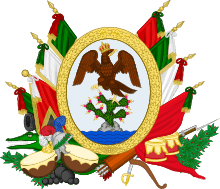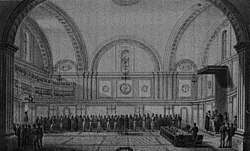National Institutional Junta
The National Institutional Junta (Spanish: Junta Nacional Instituyente) was the assembly created in Mexico on 2 November 1822 by order of Agustín de Iturbide composed of 47 members of Congress dissolved with the intention of occupying the Legislative Power instead of the Congress of 1822 extended according to the decree of 31 October 1822 where Iturbide declared that until a new congress could be convened, the national representation would fall to this Junta[1].
National Institutional Junta Junta Nacional Instituyente | |
|---|---|
| First Mexican Empire | |
 | |
| Type | |
| Type | |
| History | |
| Founded | 2 November 1822 |
| Disbanded | 6 March 1823 |
| Preceded by | Constituent Congress |
| Succeeded by | Constituent Congress (reinstallment) |
| Leadership | |
President | Juan Francisco de Castañiza |
| Seats | 47 |
| Meeting place | |
 | |
| San Pedro and San Pablo College, Mexico City | |
Its first session was held on 2 November 1822 in the San Pedro and San Pablo College, where Juan Francisco de Castañiza y González, Marquis of Castañiza, was named President of the same. Then, this Junta was in charge of several matters of immediate need and prepared a project for convening a new congress. The Junta ceased its work at the beginning of March 1823, when Agustín de Iturbide reinstated the first congress again.
List of deputies of the National Institutional Junta
| Province | Deputies |
|---|---|
| Mexico | Joaquín Román José de Sardaneta |
| Puebla | Luis Mendizábal Francisco Puig |
| Durango | Juan Francisco de Castañiza Francisco Velasco |
| Querétaro | Juan Nepomuceno Mier and Altamirano |
| Tlaxcala | Miguel Guridi and Alcocer |
| Valladolid | Francisco Argandar Antonio Aguilar |
| Oaxaca | Antonio Morales de Ibáñez Pedro Labayru |
| Guanajuato | Francisco Uraga Antonio Mier and Villagomez |
| Veracruz | José María Becerra José Ignacio Esteva |
| Guadalajara | Toribio González Mariano Mendiola |
| Potosí | Ramón Esteban Martínez de los Ríos Pascual de Aranda |
| Zacatecas | Agustín de Iriarte José María Bocanegra |
| Sonora y Sinaloa | Carlos Espinosa de los Monteros Antonio Iriarte |
| Yucatán | Manuel Lorenzo de Zavala Santiago Calderón Helguera, Count of Miraflores |
| Nuevo Mexico | Francisco Pérez Serrano |
| Nuevo Reyno de León | Juan Bautista Arizpe |
| Nuevo Santander | José Antonio Gutiérrez de Lara |
| Coahuila | Antonio Elozua |
| Texas | Refuge of the Heron |
| Antigua California | Manuel Ortíz |
| Nueva California | Ambrosio Martínez de Vea |
| Deputies for Chiapas, Guatemala, Nicaragua, Honduras, San Salvador, and Costa Rica |
|
| Deputies Substitutes |
|
References
- BENSON, NETTIE LEE. La diputación provincial y el federalismo mexicano. Colegio de México, Centro de Estudios Históricos, Universidad Nacional Autónoma de México. 1994.
See also
- Provisional Political Regulation of the Mexican Empire